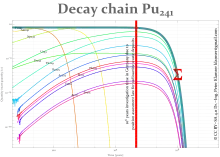In nuclear physics, the Bateman equation is a mathematical model describing abundances and activities in a decay chain as a function of time, based on the decay rates and initial abundances. The model was formulated by Ernest Rutherford in 1905[1] and the analytical solution was provided by Harry Bateman in 1910.[2]
If, at time t, there are atoms of isotope that decays into isotope at the rate , the amounts of isotopes in the k-step decay chain evolves as:
(this can be adapted to handle decay branches). While this can be solved explicitly for i = 2, the formulas quickly become cumbersome for longer chains.[3] The Bateman equation is a classical master equation where the transition rates are only allowed from one species (i) to the next (i+1) but never in the reverse sense (i+1 to i is forbidden).
Bateman found a general explicit formula for the amounts by taking the Laplace transform of the variables.
(it can also be expanded with source terms, if more atoms of isotope i are provided externally at a constant rate).[4]

While the Bateman formula can be implemented in a computer code, if for some isotope pair, catastrophic cancellation can lead to computational errors. Therefore, other methods such as numerical integration or the matrix exponential method are also in use.[5]
For example, for the simple case of a chain of three isotopes the corresponding Bateman equation reduces to
Which gives the following formula for activity of isotope (by substituting )
See also
References
- ↑ Rutherford, E. (1905). Radio-activity. University Press. p. 331
- ↑ Bateman, H. (1910, June). The solution of a system of differential equations occurring in the theory of radioactive transformations. In Proc. Cambridge Philos. Soc (Vol. 15, No. pt V, pp. 423–427) https://archive.org/details/cbarchive_122715_solutionofasystemofdifferentia1843
- ↑ "Archived copy" (PDF). Archived from the original (PDF) on 2013-09-27. Retrieved 2013-09-22.
{{cite web}}: CS1 maint: archived copy as title (link) - ↑ "Nucleonica".
- ↑ Harr, Logan (2007-03-15). "Precise Calculation of Complex Radioactive Decay Chains" (PDF). Theses and Dissertations (published 2007).